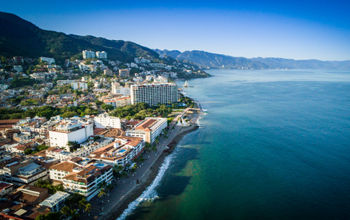What’s Trending in Mexico Travel?

Experiences in nature, sophisticated gastronomy, sustainability, and support for diversity and indigenous communities are the most representative trends that the tourist industry in Mexico is navigating.
According to essential actors in the sector, national and international tourists increasingly seek destinations and accommodations that guarantee experiences aimed at protecting nature and respecting populations of original cultures. “Our consumers want to be engaged with companies that they think are doing good, doing right, like sustainability,” says George Hunter, VP of Leisure Sales for POSADAS.
There are many examples of efforts to offer tourists experiences in the middle of nature accompanied by gastronomy made from organic ingredients and increasingly sophisticated recipes, given the boom that Mexico has experienced, in recent years, of chefs with international recognition.
For Claudia Vanessa Pérez Lamas, Jalisco’s Minister of Tourism, a destination like Puerto Vallarta has been critical in developing renowned gastronomic creators. “It’s a hotbed of new talent that has resulted in movements like the so-called `Ellas se Juntan’ (They Get Together), a group of women that promotes social gastronomy,” she says.
Puerto Vallarta is one of the destinations that drive gourmet gastronomy in Mexico, with many restaurants considered high cuisine. In addition, it hosts the Gourmet Festival, Vallarta-Nayarit Gastronomic, and Restaurant Week, among other events focused on presenting the new trends and innovations of the vast Mexican cuisine.
Martina Mairhofer, Associate Director of Sales North America for Sandos, points out that, at Sandos Caracol, a resort located in the Mexican Caribbean, “we are constantly working with our chefs, and we have just incorporated a new Corporate Director of Food and Beverages. So we always update and improve the offer to always innovate.”
Other fashionable trends in Mexico’s tourism industry focus on culture and nature that involve indigenous communities. Martha Ornelas, Puebla’s Minister of Tourism, says that “nature tourism became the number one of what tourists look for in Puebla, after cultural tourism.” The different tours in these destinations include sales of artisan products and visits to craft workshops.
Meanwhile, Fundación Sandos also does vital work in collaboration with the Maya community of Xyaat, including promoting its products with a handicrafts stand at the hotel. “We also promote tours to communities, and our guests can bring donations such as school supplies and clothing. They love helping to develop the destination communities,” says Martina Mairhofer. She explains that, in addition, within the All Nature Experience program, guests get to know cenotes, jungles, and animals from the region. They also get to know cenotes, jungles, and animals from the area and presentations of Mayan culture.
In addition, Fundación POSADAS has focused on supporting its collaborators and their families. “Now, there is a relaunch of the Foundation with many resources. We want to participate in more partnerships and help communities a lot. In all our resorts, we have a stand where handicrafts are sold, and we offer spaces to promote their culture and the items they make so that they have an economic income,” says José Jaime Lorenzo, Chief Commercial of Hotel Business for POSADAS.
Along with these initiatives, hotels, tour operators, and tourism service providers in Mexico develop programs aimed at a growing sector of visitors concerned about respect for biodiversity. “For example, 150 of our hotels are Green Key certified, with all of these processes involved, plus we have Blue Flag on all beaches. These certifications show that our operation is clean, sustainable, and concerned about the carbon footprint. However, we are still investing much effort and money in generating more certifications and having more hotels in Blue Flag and Green Key.”
Other industry initiatives are aimed at a more exclusive tourism sector interested in nature. “We are opening up a new line of business which is glamping. We open in the southeast region of Mexico, near Merida, a glamping experience with 15 luxury shops. This concept is based not only on places to stay but also on providing international guests with experiences,” says Raul Vallejo, VP of Sales and Marketing for GRUPO PRESIDENTE.
Last but not least, inclusion and diversity are among the trends that have developed most strongly in Mexico and are now crucial aspects of the tourism industry. “The Mexican government, together with the International Gay and Lesbian Travel Association (IGLTA) and Queer Destinations, signed a program to make the country more inclusive and diverse by raising awareness for all workers in the tourism sector, and Mexico is standing out above all other countries,” says Edgar Weggelaar, CEO of Queer Destinations.
In the gay-friendly segment, Puerto Vallarta has positioned itself as one of the leading destinations in Latin America with events such as the Film and Diversity Festival “Diva Puerto” and the Vallarta Pride, among others. “In addition, Guadalajara will hold the Gay Games, the largest sporting competition in the world, even superior to the Olympic Games,” says Claudia Vanessa Pérez Lamas, Jalisco’s Minister of Tourism.
For Martha Ornelas, Puebla’s Minister of Tourism, this segment is paramount for this destination with 10 Magic Towns and cities declared World Heritage by UNESCO. “It’s a segment we must address because it’s bringing a strong economic spill, and global standards demand it.” Plus, it should be noted that Puebla recently received recognition as the most inclusive state in the tourism sector.
After the effects of the pandemic, Mexico is hosting more and more visitors with highly sophisticated requirements and the industry has had to adapt quickly and respond with innovative and creative proposals to ensure the sector takes off and satisfies the taste of new generations of travelers.
